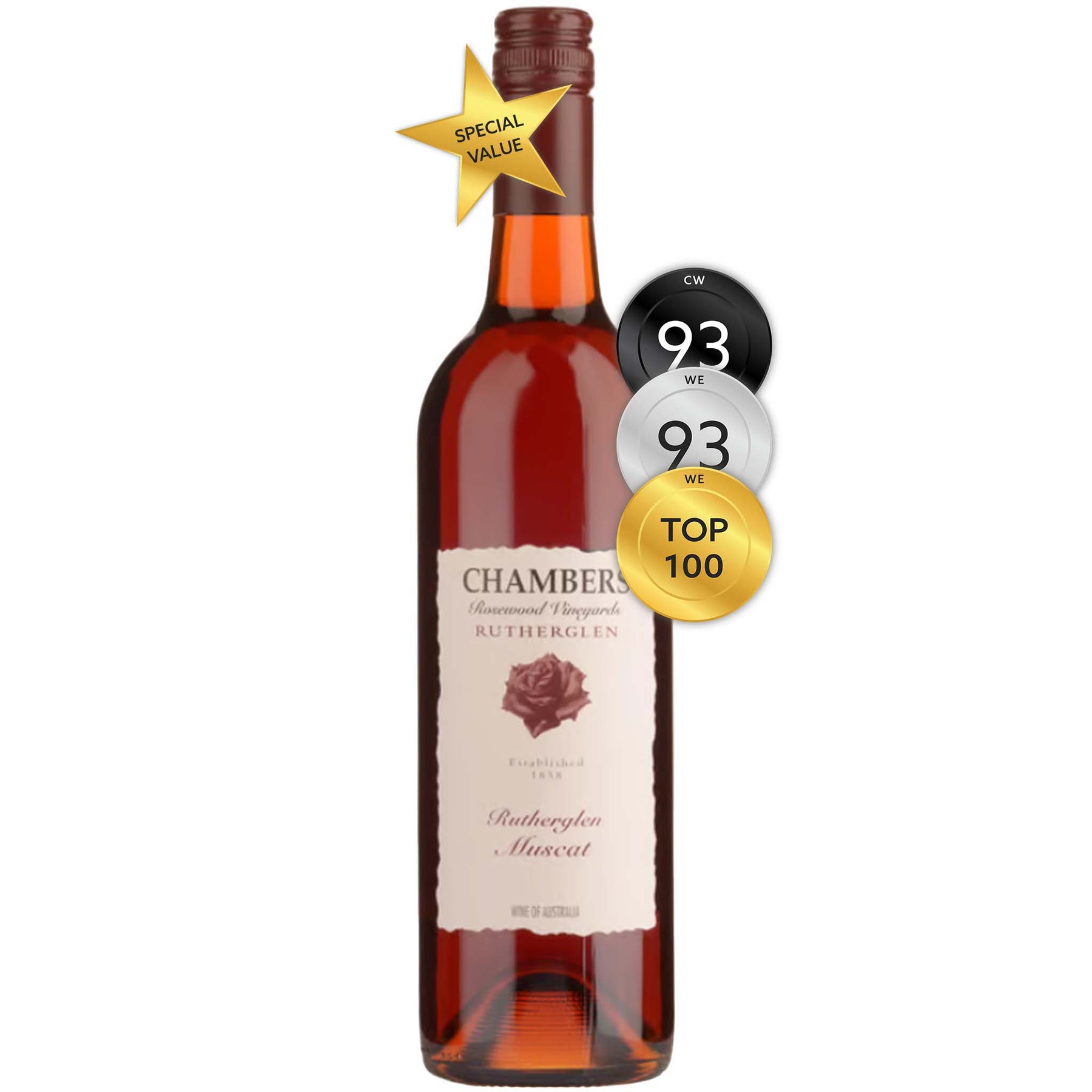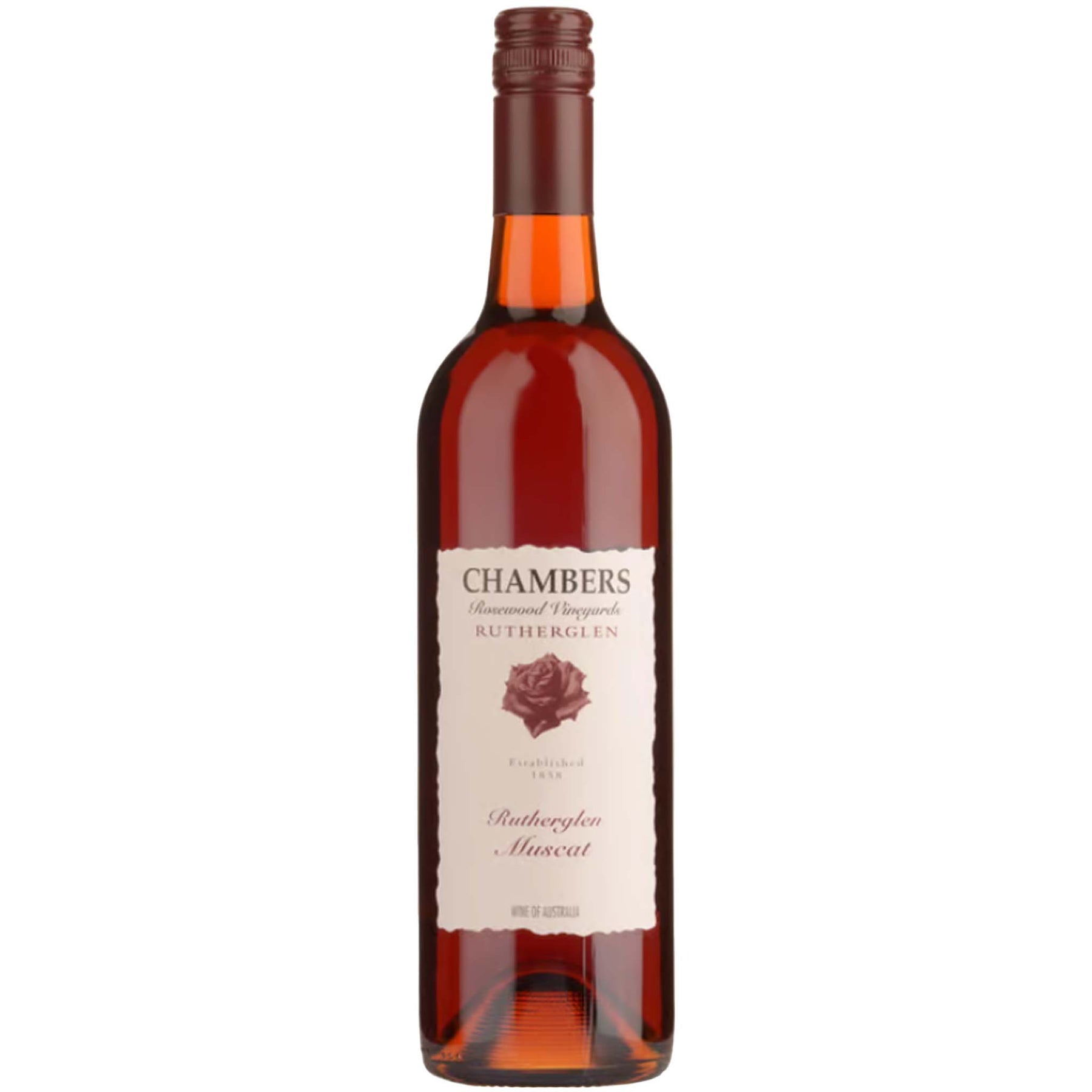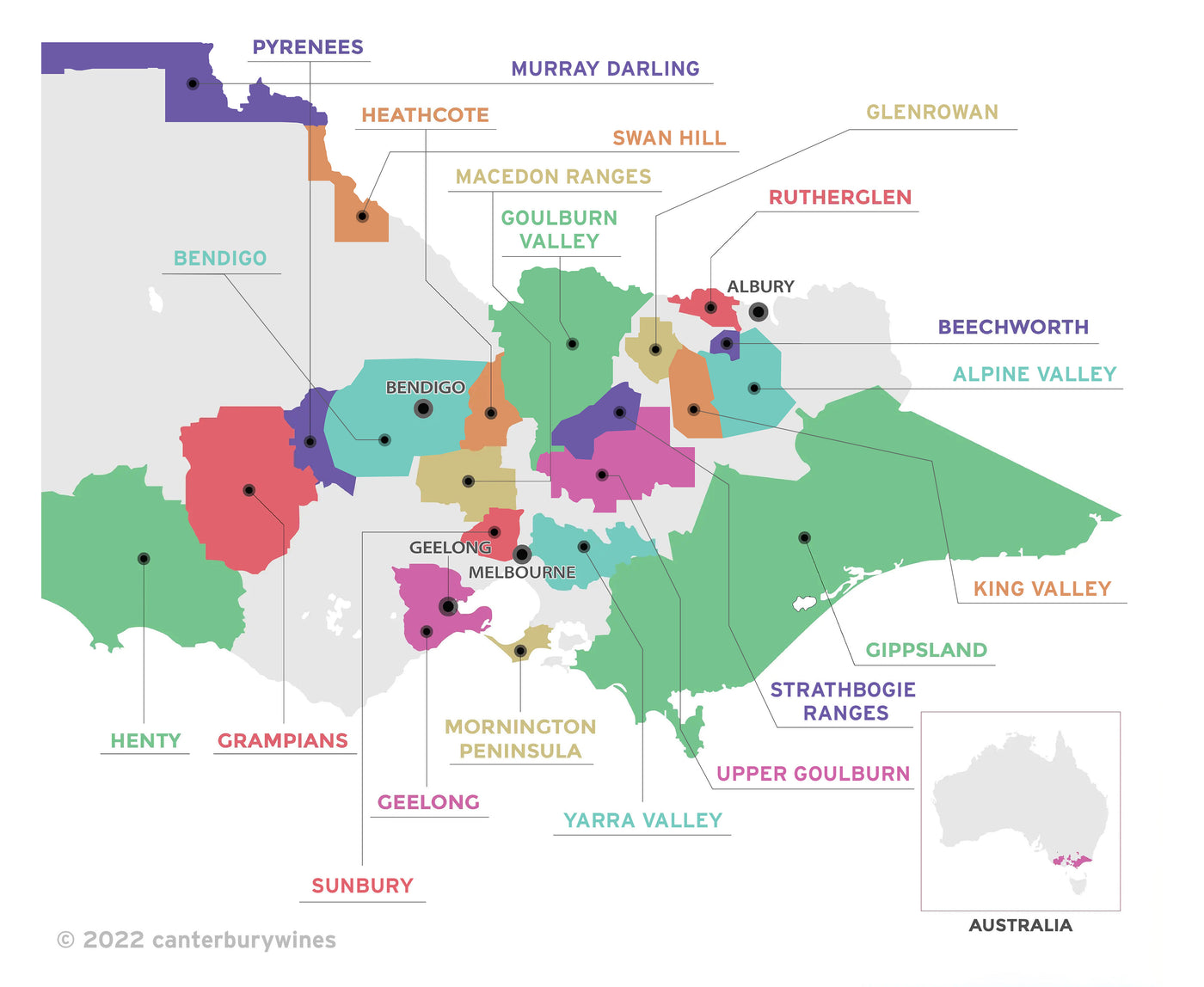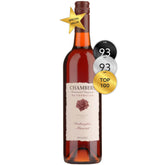

Chambers Rosewood Vineyards Rutherglen Muscat NV
Style: Fortified
Closure: Screwcap
Chambers Rosewood Vineyards Rutherglen Muscat NV
Warehouse
34 Redland Drive
Vermont VIC 3133
Australia
Producer: Chambers Rosewood
Country: Australia
Region: Rutherglen
Vintage: Non Vintage
Critic Score: 93
Alcohol: 17.5%
Size: 750 ml
Drink by: N/A
Top 100 Wines of 2021 - Wine Enthusiast
Chambers Rosewood is a small family business that is proud of its history and its wine. The influential US wine critic Robert Parker gave two of Chambers Rutherglen fortifieds 100 out of 100 in 2001, describing them as "nothing less than national treasures", and included Chambers as one of only seven Australian wineries in his book The World’s Greatest Wine Estates.
"Chambers is a benchmark producer of the Rutherglen style. Evoking enticing aromas of orange marmalade, honey, medjool dates and almond blossom, the palate continues along similar lines. Unctuous and intensely sweet, there's just enough acidity to keep this from syrup territory." Christina Pickard
Expert reviews
"Chambers is a benchmark producer of the Rutherglen style and this late-picked Muscat offers a burnt-orange-sunset hue in the glass, with a green rim. Evoking enticing aromas of orange marmalade, honey, medjool dates and almond blossom, the palate continues along similar lines. Unctuous and intensely sweet, there's just enough acidity to keep this from syrup territory. It would benefit enormously from a creamy, salty cheese pairing." Christina Pickard, Wine Enthusiast – 93 points and Top 100 Wines of 2021 (#8)
"Unctuous, elegant and oh so drinkable. Outstanding value." Nick Munday, Canterbury Wines - 93 points and Special Value Wine ★
Awards
Top 100 Wines of 2021 - Wine Enthusiast
Special Value Wine – Canterbury Wines ★
Bill Chambers

Bill in the old Chambers Rutherglen cellar. Photo: Milton Wordley
The following article on Bill Chambers by Milton Wordley is taken from 'People of Wine', https://winetenquestions.com.au/
The influential US wine critic Robert Parker gave two of Chambers Rutherglen wines 100 out of 100 in 2001 and included Chambers as one of only seven Australian wineries in his book The World’s Greatest Wine Estates. Describing them as "nothing less than national treasures" and "some of the world’s most remarkable dessert wines".
I was in Melbourne and thought Bill Chambers would be an interesting bloke to meet, as did a number of other readers. He’s high up on the list of suggestions. So I arranged a meeting.
Bill’s been described as "the undisputed king of the fortified wine business".
His family winery 'Chambers Rosewood', in Rutherglen, north-eastern Victoria, has consistently earned international acclaim for its fortified wines including muscat, tokay, port and sherry.
Here’s his story.
How did you get involved with wine?
My family have grown grapes and made wine at Rutherglen since the early 1860s.
The family originally came from Norfolk county in England. They had been interested in wine for many years, they spent time over in France and probably got an interest in vines over there.
My father decided that as I was his eldest son, I should inherit my grandfather’s farm and cellars. Dick Buller, our next door neighbour, was sent to Roseworthy Agricultural College and had returned to Rutherglen after doing the oenology course with Mr Hickinbotham.
My father was impressed with Dick’s winemaking skills so I was sent to Roseworthy in 1950 to do the diploma of oenology.
Did you have an interest in wine as a young man?
No none at all. During the School holidays my six brothers and I, spent some time in the vines but it was only after I started the wine course that I became passionate about wine.
Grandfather didn’t know much about winemaking and so he thought I should go on and learn it.
Roseworthy was a wonderful place. John Vickery was in my year. We had to do a vintage somewhere each year – I did my first at Seppelts and the second was at Lindemanns. I was a bit more useful then because I knew a bit more. After Roseworthy I was planning to work in Mildura but ended up working in Clare.
You took over the family business in 1960 – how was that?
I came back to Rutherglen after spending 4 years at Clare working for Stanley Wine Company owned by the Knappsteins. My grandfather died in 1956 and my father had cancer. I made the wine at St Leonards in ’59 with the help of Harold Cofield who was foreman there. During the next year my father hired a cooper to fix up the casks at Rosewood which had been empty for 10 or 12 years.
In 1960, with the help of Syd MacMahon, the cellarman, book keeper and general factotum at Rosewood, we were able to get the old machinery and wooden fermenting vats into working order and make the 1960 vintage at Rosewood.
My father died just before vintage. Things were fairly tough, the vines were replanted after Phyloxera in about 1908 and 1917. We were told at Roseworthy the life of a vineyard was about 40 years.
A further problem was that probate needed to be paid for a second time after my Grandfather’s death, so I had to make do with the older machinery and casks for many years.
My Mother came and looked after the books and customers, after my father, Syd died in 1961.
Robert Parker has given your rare wines 100 points a couple of times – definite high points?
I did not meet Mr Robert Parker – he did not wish to meet people whose wines he tasted because it might influence the result of his tastings.
It happened because one evening, very late, almost 11 o’clock and I had gone to bed, a very enthusiastic young man who had represented Brown Brothers in England, brought up Mr Chatterton from New York and he tasted the Muscat and Muscadelle.
He liked them very much and wished to buy quite a lot at half the price I had quoted. I said, "You can haggle on the price of the young wines but not on the old stuff – the price is not negotiable".
So he bought 5 dozen of each and that is how Robert Parker came to taste these wines.
He described them as "decadent" and "hedonistic with an aftertaste lasting 5 or more minutes." We only reblend the old wines when we have an excellent vintage which occurs only once or twice a decade.
What it is about this area that produces such distinctive wines?
Because this is a small area which generally has a long dry autumn and the grapes accumulate high sugar and flavour.
It’s also a pretty hot area. We make our best wine when we get the most rain and its cooler.
I reckon it’s getting hotter every year, not sure if it’s the hole in the ozone layer, but we are definitely seeing some climate change.
What has happened to Australia’s interest in fortified wine?
They are generally more alcoholic than table wines but we do sell them especially Muscat and Muscadelle.
We also make a lower alcohol sweet red and Muscat at 15% and they sell well.
You still make fortifieds here – who is drinking them?
Mostly older people but if the younger people taste them, they generally buy a bottle. We are planting more Palomino to meet the demand for Dry Flor.
You judged and chaired wine shows from 1962 ‘til 2000 – how did you get involved?
While I was working at Clare I was invited to be a steward at Adelaide in 1957.
In those days I didn’t drink much, unlike a lot of blokes in the industry – particularly the blokes that sold it. I tasted a lot – but I didn’t drink much. So I found the first day of judging difficult – and often felt seedy the next day.
My father used to talk about getting in training for anything and this was no different.
He reckoned there was an enzyme in the liver that built up after a while – he encouraged me to take a whisky a day to keep this enzyme going.
When I got back to Rutherglen in ’58 I was asked to Melbourne Show as an associate judge for 3 years I think 1959, 60 and 61 and then during ’62 I became a judge in Melbourne and shortly afterwards in Adelaide and Sydney.
I enjoyed the shows and judges were very kind and helped and encouraged me.
I became Chairman of Melbourne show in 1980 and retired from judging about 2002.
Any memorable wines along the way?
I was privileged to taste early Grange Hermitages.
Penfolds were the first to spend serious money on new oak.
I believe that Max also always insisted on buying the best fruit. They were big flavoursome wines that were able to carry the wood.
One night a friend and I looked at a number of 20 year old Granges, Bordeauxs and Burgundies. Grange stood up to them very well.
I also saw while judging, the effects of stainless steel and refrigeration which Colin Gramp had brought from Germany to make Pearl wine.
He revolutionised white wine making in Australia with this equipment.
Last supper?
I would hope I could have a good steak with a Domaine de la Romanee Conti or a La Tache but now it probably will be a glass of water and a boiled egg!
I’m told you read ancient Greek!
No no no ! This story came about because I love to read poetry.
I enjoy the challenge of both Greek and Latin but it is a hobby and now I have trouble remembering.
Who influenced you?
My mother influenced my love of reading.
The Roseworthy lecturers, John Fornachon, Rex Kuchel and Dr Bryce Rankine influenced my passion for learning more about wine.
Latterly Berek Segan showed me some wonderful European wines that I would never otherwise have tasted.
Anything else you’d like to say?
Not really. The wine industry’s been very good to me.
If you ever had problems there has always been someone to help. It’s looked after me really well.
An English friend told my father, "Never get out of the wine industry – there will always be a demand."
About the winery

Chambers Rosewood Vineyards & Winery is a small family business that is proud of its history and its wine. It was established in 1858 by William Chambers who had emigrated to Australia. William leased a plot of land near Rutherglen and with the help of his son Philip, he planted a rose hedge around the boundary and named the property Rosewood.
Both William and Philip had knowledge of viticulture from time spent in France and Rosewood happened to be situated opposite one of the regions earliest vignerons, Anton Ruch. In 1862 William purchased Rosewood and the rest is history.
Fast forward to the 1890s and 3rd generation Will who sets the foundations of many of the soleras during this period, in particular the Muscat and Muscadelle (Topaque). Will’s skill at blending and ability to assess wines was later demonstrated by years of success at wine shows starting in 1901 through to the 1920s and 30s.
In 1899 Phylloxera struck Rutherglen and the entire vine stock at Chambers was uprooted and burnt. In 1901 Chambers began replanting the vineyard using Phylloxera resistant rootstocks from America.
Third generation Will passed away in 1952 and sadly 4th generation Arthur a couple of years later, leaving his wife Peggy and 7 children to run the estate. In 1959, 5th generation William (Bill) returned to Rutherglen from South Australia, after studying winemaking at Roseworthy Agricultural College where he took out the gold medal as dux and working at Stanley Wine Company.
Bill oversaw the revitalisation of the vineyard and continued to maintain the soleras started by his grandfather, all the while producing high quality Muscat and Muscadelle wines. In 2001 Bill's son, 6th generation Stephen, took up the role of winemaker. Today, both Bill and Stephen manage the estate. They are caretakers and custodians of their land and wine.
The Chambers family acknowledge their history and heritage and strive to uphold the age-old winemaking processes, whilst protecting the rich, fertile soil which they are privileged to sit upon. They use a blend of traditional and modern wine production methods, all the while respecting and balancing nature and biodiversity.
Chambers nurture precious vines as old as 120 years and grow a wide range of varieties. The jewels in the crown are Muscat and Muscadelle. Other varieties include Palomino, Roussanne, Riesling, Traminer, Shiraz. Gouais (a parent of Chardonnay and Riesling), Tempranillo, Durif, Mondeuse, and Cinsault. They use large tanks, oak casks & barrels (some casks dating back to the 1800s) to age and refine their premium wines.

Chambers Rosewood: Six Generations of Winemakers
Top L to R: William Chambers, Philip Chambers, Will Chambers
Bottom L to R: Arthur Chambers, William (Bill) Chambers, Stephen Chambers

Victoria
Victoria is home to more than 800 wineries across 21 wine regions. The regions are Alpine Valley, Beechworth, Bendigo, Geelong, Gippsland, Glenrowan, Goulburn Valley, Grampians, Heathcote, Henty, King Valley, Macedon Ranges, Mornington Peninsula, Murray Darling, Pyrenees, Rutherglen, Strathbogie Ranges, Sunbury, Swan Hill, Upper Goulburn and Yarra Valley.
Victoria's first vines were planted at Yering in the Yarra Valley in 1838. By 1868 over 3,000 acres had been planted in Victoria, establishing Victoria as the premier wine State of the day. Today, the original vineyards planted at Best's Wines are among the oldest and rarest pre-phylloxera plantings in the world.
Victoria's climate varies from hot and dry in the north to cool in the south and each wine region specialises in different varietals. For example, Rutherglen in the north is famous for its opulent Muscats and Topaque and bold reds, while the many cooler climate regions near Melbourne produce world class Chardonnay and pinot Noir. Victoria is truly a wine lover's playground.

